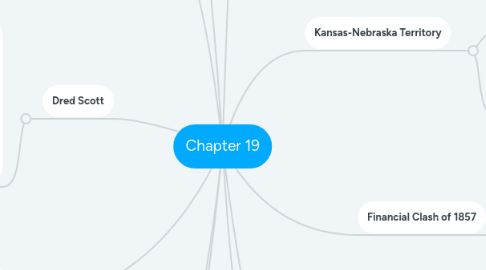Chapter 19
par Shelby Caldwell


1. Formed in February 1861 • Location: Met in Montgomery, Alabama and formed the Confederacy (Later moved to Richmond, VA) Why? Answer: to bleed out resources from Washington, DC • President of the Confederacy (South) was Jefferson Davis – former Secretary of War “the time for compromise is over”
2. John Brown
2.1. abolitionist Sent by God “in revenge for Sack of Lawrence” “a man made of the stuff of saints” - Moved to Kansas from Ohio to abolish the slavery argument - Spilled into Osawatomie Creek then into Pottawatomie
3. Violence in the Senate / Sumner Vs. Brooks / Caning of Sumner (May, 1856)
3.1. Sen. Charles Sumner (Mass. / northerner abolitionist) writes a speech entitled “Crime against Kansas” (attacks slavery issues, fugitive slave laws and the Kansas-Nebraska Act) – later to become the “rallying or battle cry against slavery” • Congressman Preston Brooks (South Carolina Congressman / southerner) attacks Sumner in the Senate Chamber • Brooks caned Sumner in the head until it broke (brain damage) / Southerners presented Brooks with an other cane with the inscription “Hit Him Again!!!!! • Sumner went to Europe for surgery • Mass. Elected Sumner, ceremoniously, to an empty seat.
4. Dred Scott
4.1. (1856) Slave owner took Dred Scott (slave) from Missouri & lived in a FREE territory (Illinois) for 4 years - later, returned to Missouri, owner died...Dred Scott begins a lawsuit for the grant of freedom for him and his wife • Missouri Supreme Court ruled against • Dred Scott appeals and Supreme Court “upheld” the Missouri Decision • Dred Scott V. Sandford • African American citizenship does not occur until Reconstruction (1865-1877) with the 14th Amendment
5. 1860 Presidential Race
5.1. Lincoln – Republican • Douglas – Northern Democrats • Breckinridge – Southern Democrat: Didn’t prefer Douglas because of the disconnection to the Lecompton Constitution and the Freeport Doctrine. Promoted extension of slavery and annexation of slave-populated Cuba • Bell – Constitutional Union Party – into compromise.
6. Confederate States of America / C.S.A.
7. Stowe and Helper: Literary Incendiaries
7.1. Uncle Tom’s Cabin – Harriet Beecher Stowe (Abolitionist from Ohio) - 1852 *Written in response to the ungodliness of slavery and the Fugitive Slave Act of 1850. Focus: Immorality of slavery (especially the splitting of families) - “God wrote it.” – Stowe Connect to Second Great Awakening (religious reform) - post Calvinistic mentality (pre-destination/pre- determination) - focused on individuality When introduced to Lincoln- “So, you’re the Little lady that started this great war!”
7.2. International reactions – Commoners of London and Paris enjoyed the portrayal of Northern American life against slavery - “Tom Mania” (2) Impending Crisis of the South – Hinton Helper from North Carolina Point: Argue statistics of the economic blow to the non-slave holder. - Hated the Southern planter (*elite)
8. Kansas-Nebraska Territory
8.1. Stephen Douglas Provided: Popular Sovereignty S received: a chance to argue for slavery N received: a chance to argue against slavery Union received: Organization / Railroad
8.2. Both Northern abolitionists and Southern slavocrats (border ruffians from Missouri) turned this into a battleground due to slavery. Kansas want to become a SLAVE state!
9. Financial Clash of 1857
9.1. More negative psychologically than economically (lack of trust in banking, federal government)
9.1.1. Causes: – Cali gold leads to inflated prices of goods – Crimean War *(overstimulated the growth of wheat and grain) = leads to “Speculation”
9.1.2. Results: (1) thousands of businesses failed (2) Unemployment (3) Federal government Homestead Acts – 160 acres of free land for Westerners
